Research Projects
Ongoing Projects
In a world where science, technology, engineering and mathematics (STEM) represent a cornerstone of progress, promoting relevant competencies, educational paths, and professions in this field is of crucial importance. This is also a significant political goal in Switzerland. As a result, numerous STEM initiatives aim to foster interest and enthusiasm among students for STEM subjects. However, we lack a systematic basis for assessing the effectiveness of STEM initiatives. Our project addresses this issue. It aims to develop an innovative, transferable, and scalable evaluation tool that measures the effectiveness, efficiency, and equity of STEM initiatives.
To make the interest and enthusiasm for STEM measurable, we generate a 360° perspective and conduct surveys among students, parents, and teachers. Repeated surveys enable us to assess both the immediate impacts right after the implementation of an initiative and its medium-term effects three months post-intervention.
The focus is on changes in attitudes towards STEM subjects and careers. We use state-of-the-art technologies and present participants with images of STEM careers generated by artificial intelligence to convey a realistic and appealing picture of these career paths.

We tackle the challenge of determining the direct impact of STEM initiatives by employing the gold standard of experimental research. By randomly assigning participants to control and intervention groups, we minimize biases from external factors such as socioeconomic background. Additionally, we compare pre- and post-outcomes for programme participants.
Our evaluation approach is implemented in two STEM initiatives:
CYBATHLON@school: A six-hour program for primary school classes, where students explore the application of STEM to overcome the challenges faced by people with disabilities. This project is funded by the strategic initiatives of ETH Zurich within the framework of the UBS and ETH Zurich STEM initiative.
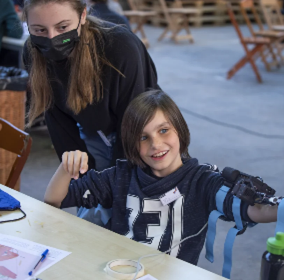
external pageGO4IT:call_made A four-hour, interactive program for secondary school classes, where students engage with their career orientation and learn more about IT careers and programming on laptops. This project is funded by the SATW.

By evaluating these projects, we gain a better understanding of how STEM initiatives can shape the next generation. We also provide concrete, evidence-based recommendations for the design of future educational programs. Our goal is to bridge the gap between education and a future where STEM skills play a central role.
This project was commissioned by the Swiss Contractors‘ Association (SCA) to investigate the challenges facing the main construction sector in the course of technological change. The focus is on the profession of construction manager. The construction manager training was previously organised at Colleges of Higher Education. In the future, this training will be organised as Advanced Federal Diploma of Higher Education This organisational change is to be accompanied scientifically. In a first step, the educational and labour market mobility of construction manager at Professional Education Institutions will be studied using the survey on Professional Education (eHBB) and the Longitudinal Analyses in the Field of Education (LABB). In a second step, schools, employers’ associations, employers and students will be surveyed in order to recognise obstacles in the transformation process at an early stage and be able to react to them.

Arbeitsmarkt- und Bildungsmobilität in der Bauführung
Analyse von ehemaligen Studierenden mit Abschluss zum/zur diplomierten Techniker:in HF Bauführung
in german language

Transformation der höheren Berufsbildung in der Bauführung
Erster Bericht: Einschätzungen von Organisationen der Arbeitswelt und Bildungsanbietern
in german language
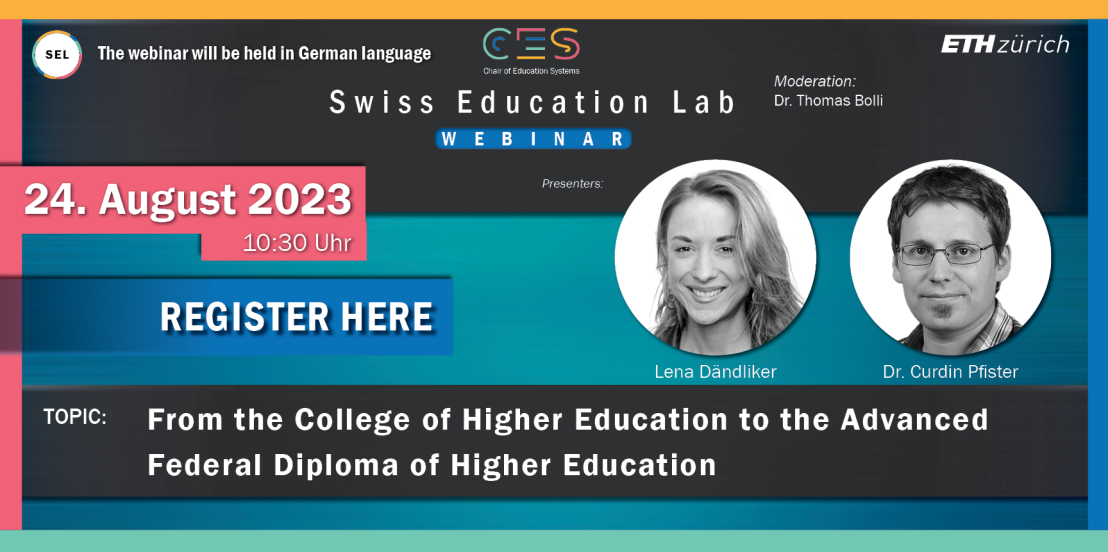
In the eighth SEL webinar, Curdin Pfister from the Swiss Construction Sector Association (SCA) presents the objectives of the change of the construction management education programme from a College of Higher Education to an Advanced Federal diploma of Higher Education from the perspective of the association. Lena Dändliker of ETH Zurich presents the results of a study on the first part of the scientific monitoring of the change in the education programme. The study looks at the question of where students of the construction manager programme from the College of Higher Education come from and where they go after graduation. The subsequent discussion is about the challenges of the change in the programme from a College of Higher Education to an Advanced Federal Diploma of Higher Education.
Commissioned by the State Secretariat for Education, Research and Innovation (SERI), this project examines the challenges of procedures in which individuals can have their non-formally and informally acquired educational achievements recognized towards formal VET qualifications: the "recognition of prior learning". On the one hand, the educational and employment system context in Switzerland as well as the current status of "recognition of prior learning" in basic vocational education in Europe are discussed on the basis of a literature review. On the other hand, a survey of the collaborative partners will be used to investigate where possible obstacles to a greater dissemination of such procedures in basic vocational education exist. In a policy workshop it will be processed how these could be improved.
Study in german:
Anerkennung von Bildungsleistungen - Analyse bestehender Verfahren im nationalen und internationalen Kontext
This project investigates the influence of the digital transformation on the Swiss education system by means of structured surveys of students and graduates of higher technical colleges. It analyzes, for example, the extent to which the digital transformation makes additional education and training necessary and how it influences job satisfaction.
Bolli, T., Pusterla, F. (2021)
Decomposing the Effects of Digitalization on Workers' Job Satisfaction. CES Working Papers, 4.
Bolli, T., Pusterla, F., und U. Renold (2021)
external pageAuch während Covid-19 erhöht Digitalisierung die Arbeitszufriedenheit der Diplomiertencall_made, ODEC-Bulletin, 4, 2021,
Pusterla, F., T. Bolli and U. Renold (2020)
external pageWie beeinflusst die Digitalisierung die Arbeitszufriedenheitcall_made, ODEC-Bulletin, 2, 2020
Pusterla, F., T. Bolli and U. Renold (2020)
external pageWie beeinflusst die Digitalisierung den Arbeitsalltagcall_made, ODEC-Bulletin, 1, 2020
Pusterla, F., T. Bolli and U. Renold (2018)
external pageSo nehmen HF-Diplomierte die Digitalisierung wahrcall_made, ODEC-Bulletin, 2, 2018
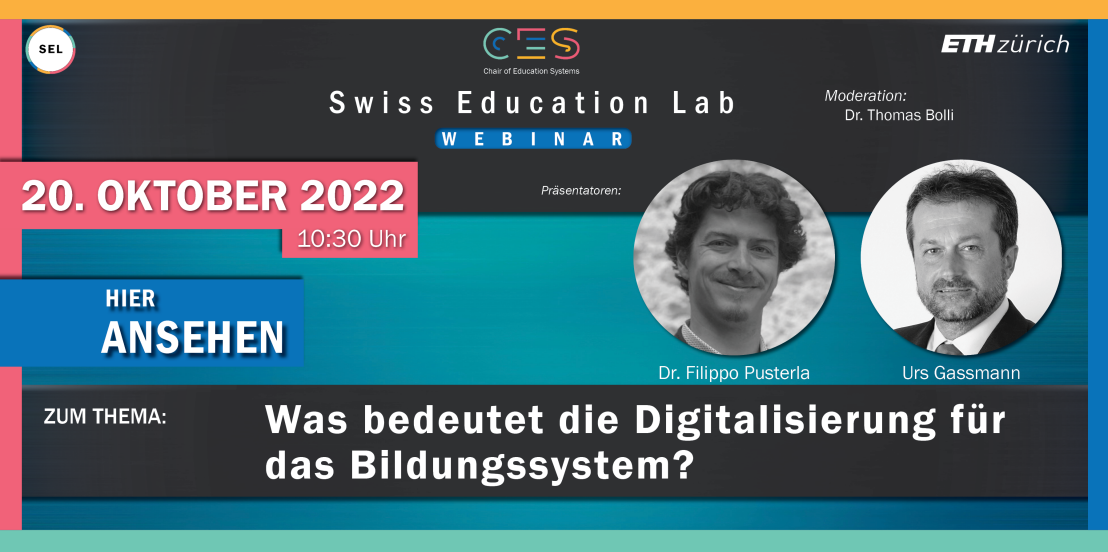
The third SEL webinar is about the influence of digitalization on the education system. Filippo Pusterla of ETH Zurich and EHB examines what additional education and training is necessary due to digitalization.
Urs Gassmann of ODEC analyzes how employers support this additional education and training.
On behalf of the Dock Group, this project, in cooperation with inspire AG, is investigating the possibilities of employing people from the second labor market who have been laid off in metalworking companies in Switzerland. The second labor market must not compete with the first labor market. Therefore, it is limited to activities that would otherwise no longer be performed in Switzerland. This project uses semi-structured interviews to investigate where the production processes show potential for employment, how integration into these processes can take place, what qualification requirements exist, what obstacles exist and what qualification opportunities are opened up.

In the current Swiss economy, many companies suffer from a shortage of skilled workers. One solution is the integration of workers from the second labour market in company’s production processes, operating in the manufacturing and plastic industries. How can individuals from the second labour market be integrated into the manufacturing and plastic industry in Switzerland? Special attention in this study is given to the so-called shop-in-shop model, which integrates workers from the second labour market directly on-site into the company's production chain. Employers pay output-based expenses for the work performed. By settling directly within the companies’ respective production chains, both the motivation and integration of people from the second labour market could be improved.
This study analyses the potential of the second labour market in the manufacturing and plastic industry. Study results show that the potential in the highly qualified and largely automated manufacturing industry is limited. In contrast, the plastic industry offers greater potential, as there is a higher prevalence of easily performed tasks. Experts in the plastic industry cite a lack of basic competencies and "soft skills" as the main obstacles to integrating people from the second labour market. The study also shows that companies' concerns about quality assurance and staff care in the shop-in-shop model are based on misunderstandings that can be resolved through targeted communication.
Finally, this study discusses approaches through which companies may profit from the integration of individuals from the second labour market in their production chains. Thus, the study makes an important contribution to the discussion on social responsibility in the modern economy. The shop-in-shop model leads to a "win-win" situation for all participants: people from the second labour market, employers, and society.

Potenzialanalyse zweiter Arbeitsmarkt
Potenzial in der Schweizer Fertigungsindustrie
in german language
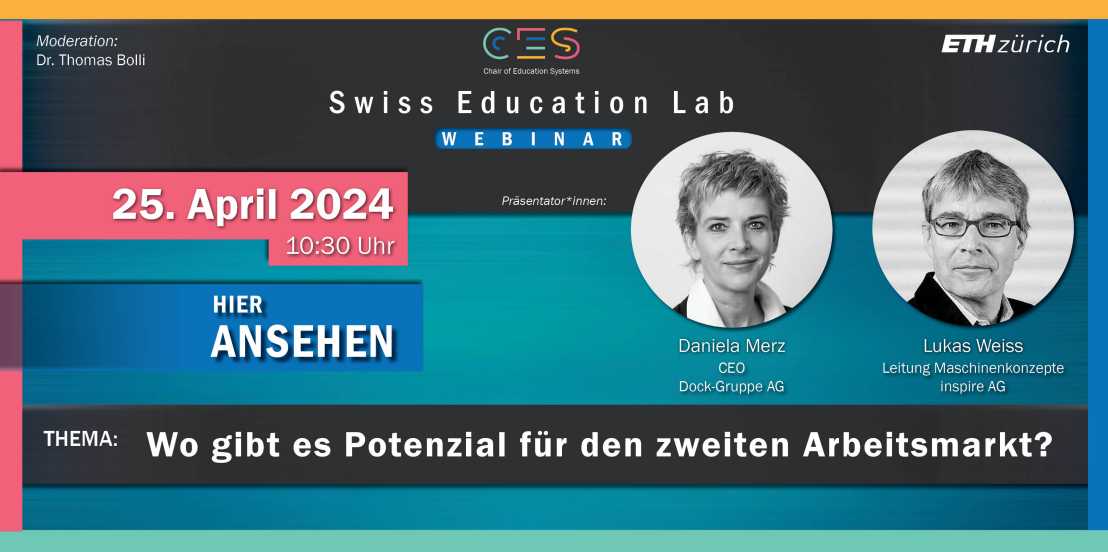
In the twelfth SEL webinar, Lukas Weiss from inspire AG presents the study “Potential analysis of the second labor market”. The study examines the potential and obstacles for the second job market in the Swiss manufacturing and plastics industry.
Daniela Merz from Dock-Group AG reflects on the results from the perspective of the second labor market.
Completed projects
This research project, in collaboration with Yousty AG, investigates the impact of the COVID-19 pandemic on basic vocational training in Switzerland. The monthly survey of apprenticeship companies allows an analysis of the situation of the apprenticeship companies, the apprenticeship market and the young people before, during and at the end of an apprenticeship. The results of the monthly survey are published at the beginning of the following month and compared with those of the previous months. In this way, the ApprenticeshipPulse surveys the short- and medium-term effects of the COVID-19 pandemic on basic vocational training and is intended to help assess the long-term effects as well.
external pageFurther information in germancall_made
Bolli, T., Morlet, G. (2022).
Working from home is here to stay, but how does it affect learning processes? Evidence from Swiss training firms during the COVID19 pandemic. CES Working Papers, 8.
Bolli, T., Dändliker, L., Morlet, G. & Renold, U. (2021).
Folgen der COVID-19-Pandemie für den Berufsbildungs- und Lehrstellenmarkt in der Gastronomie und Hotellerie: Bericht 1: Analyse von LehrstellenPuls Daten. CES Studien, 23.
Bolli, T., Caves, K. M., Pusterla, F., Rageth, L., Renold, U., Sritharan, A., & Trachsel Díaz-Tejeiro, S. (2021).
Identifikation der Auswirkungen von COVID-19 auf die berufliche Grundbildung in der Schweiz: Wie beeinflusst COVID-19 den Kompetenzerwerb von Berufslernenden?, CES Studien, 13.
Bolli, T., Caves, K. M., Pusterla, F., Rageth, L., Renold, U., Sritharan, A., & Trachsel Díaz-Tejeiro, S. (2020).
Identifikation der Auswirkungen von COVID-19 auf die berufliche Grundbildung in der Schweiz: Bericht zu den monatlichen Befragungen bei Lehrbetrieben von April bis August 2020 mit Fokus auf die Gewichtungsmethodik. CES Studien, 7.
Bolli, T., Oswald-Egg, M. E., Rageth, L., & Renold, U. (2020).
Zweiter Bericht zum AKAD-Bildungsangebot zur Berufsmaturität II: Ergebnisse einer Ehemaligenbefragung. CES Studien, 3.
On behalf of the Interessengemeinschaft Berufsbildung Bekleidungsgestaltung (IBBG), this research project investigates the development of vocational graduates after their basic vocational training as garment designers or garment sewers. Based on a structured alumni survey, semi-structured interviews with experts and longitudinal analyses in the field of education, the potential of the competences acquired in the basic vocational training in the textile and fashion market will be presented and any gaps identified. In this way, market-based indications for the further development of competencies in basic vocational training in apparel design can be identified.
Au Yong Lyn, A., Bolli, T., Rageth, L., & Renold, U. (2022).
external pageVerbleibstudie und Kompetenzanalyse Berufsbildung Bekleidungsgestaltung. Bericht zur Analyse der Arbeitsmarktsituation und Zusammenfassung der Forschungsergebnisse: Schlussberichtcall_made. CES Studien 29.
Au Yong Lyn, A., Bolli, T., Rageth, L., & Renold, U. (2021).
external pageVerbleibstudie und Kompetenzanalyse Berufsbildung Bekleidungsgestaltung. Bericht zu den Bildungsbiografien von Ehemaligen einer beruflichen Grundbildung in der Bekleidungsgestaltung: Zwischenberichtcall_made. CES Studien 17.
Bolli, T., Rageth, L., & Renold, U. (2021).
external pageVerbleibstudie und Kompetenzanalyse Berufsbildung Bekleidungsgestaltung. Bericht zu den Interviews mit Expert*innen aus der Bekleidungsgestaltung: Zwischenberichtcall_made. CES Studien 16.
Bolli, T., Rageth, L., & Renold, U. (2020).
Verbleibstudie und Kompetenzanalyse Berufsbildung Bekleidungsgestaltung. Bericht zur Berufsentwicklung, Kompetenzanalyse und Ehemaligenbefragung: Zwischenbericht I. CES Studien, 2
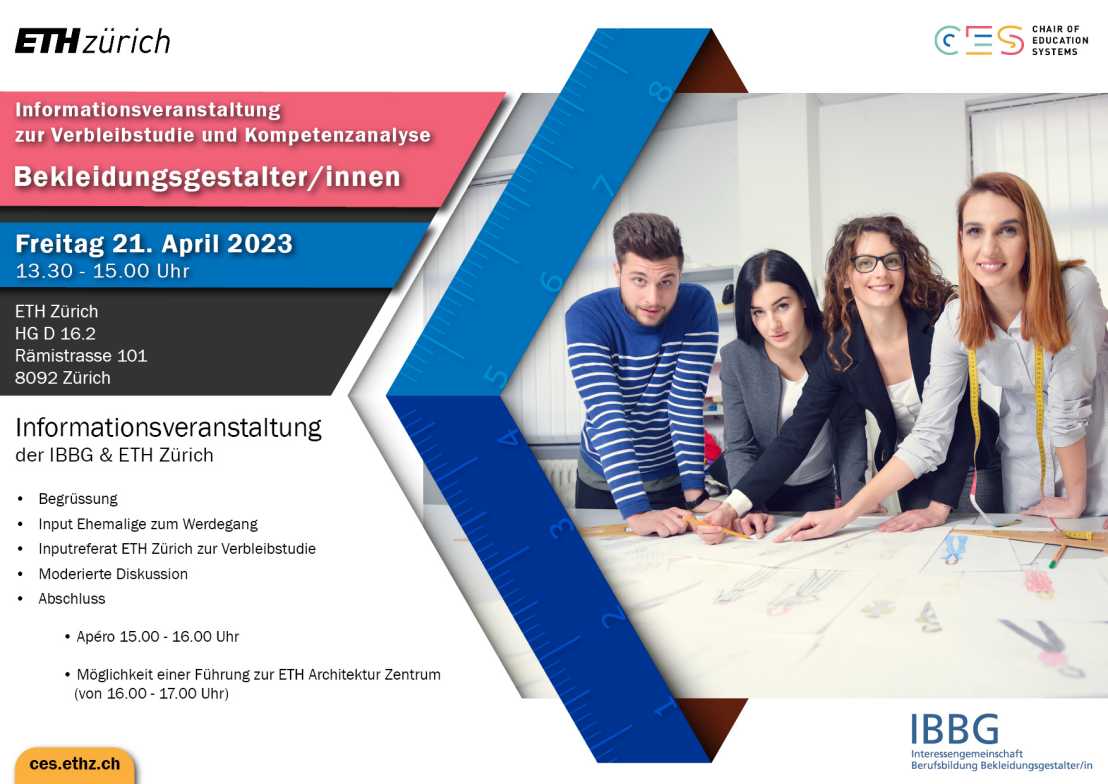
The information event summarises the results of several studies. These combine qualitative and quantitative methods to better understand career development and the potential of acquired competences after completion of a VET programme in fashion design. In addition to the relevant curricula, the SERI career development database, structured surveys of alumni, longitudinal analyses in the field of education (LABB) by the FSO and semi-structured interviews with experts are used. The results show that the Initial VET in fashion design provides a good basis for starting and continuing the career.
Verbleibstudie und Kompetenzanalyse Berufsbildung Bekleidungsgestaltung. Bericht zur Analyse der Arbeitsmarktsituation und Zusammenfassung der Forschungsergebnisse
(in German)
Berufliche Grundbildung Bekleidungsgestaltung
Informationsbroschüre (in German)
DownloadPresentation (PDF, 1.5 MB)vertical_align_bottom
(in German)
external pageYoutubecall_made
On behalf of AKAD College, this research project analyzes the effectiveness of distance learning in obtaining a vocational baccalaureate. To this end, structured student surveys, administrative data from the private education provider AKAD, and longitudinal analyses in the education sector are used to examine the relationship between face-to-face instruction and educational success. Educational success is measured by the development of soft skills during the training, the passing of the vocational baccalaureate examination and the educational progress as well as the labor market situation after graduation.
Au Yong Lyn, A., Bolli, T., Hulfeld F., Morlet, G., Oswald-Egg, M. E., Rageth, L. & Renold, U. (2022).
Schlussbericht zum AKAD-Bildungsangebot zur Berufsmaturität II. CES Studien, 28.
Bolli, T., Morlet, G. & Renold, U. (2022).
Fünfter Bericht zum AKAD-Bildungsangebot zur Berufsmaturität II: Ergebnisse der Längsschnittbefragung von Studierenden. CES Studien, 27.
Au Yong Lyn, A., Bolli, T., Rageth, L., & Renold, U. (2021).
Vierter Bericht zum AKAD-Bildungsangebot zur Berufsmaturität II: Analyse von Daten aus Bildungs- und AHV-Registern. CES Studien, 15.
Bolli, T., Oswald-Egg, M. E., Rageth, L., & Renold, U. (2021).
Dritter Bericht zum AKAD-Bildungsangebot zur Berufsmaturität II: Was bestimmt die Wahl des Ausbildungsweges? CES Studien, 12.
Bolli, T., Oswald-Egg, M. E., Rageth, L., & Renold, U. (2020).
Zweiter Bericht zum AKAD-Bildungsangebot zur Berufsmaturität II: Ergebnisse einer Ehemaligenbefragung. CES Studien, 3.
Renold, U., Bolli, T., Hulfeld, F., & Oswald-Egg, M. E. (2019).
Erster Bericht zum AKAD-Bildungsangebot zur Berufsmaturität II: Wirksamkeit von Präsenzunterricht und Frühwarnystem (No. 136). KOF Studien.
Renold, U., Bolli, T., Hulfeld, F., & Oswald-Egg, M. E. (2019).
external pageChancen und Herausforderungen des Selbststudiums.call_made SGAB Newsletter, 3.
This project is commissioned by HotellerieSuisse to investigate the consequences of the COVID-19 pandemic for the education sector and the labor market of the hotel and hospitality industry. The monthly company survey of the Apprenticeship Pulse provides information on the apprenticeship market, the acquisition of competencies by apprentices and career entry. In addition, data from Yousty AG's Occupation Finder show the development of young people's preferences.
Dändliker, L., Oswald-Egg, M. E., Bolli, T. & Renold, U. (2022).
external pageFolgen der COVID-19-Pandemie für den Berufsbildungs- und Lehrstellenmarkt in der Gastronomie und Hotellerie: Bericht 2: Interessen und Bewerbungsverhalten von Jugendlichen.call_made CES Studien, 30.
Bolli, T., Dändliker, L., Morlet, G. & Renold, U. (2021).
Folgen der COVID-19-Pandemie für den Berufsbildungs- und Lehrstellenmarkt in der Gastronomie und Hotellerie: Bericht 1: Analyse von LehrstellenPuls Daten. CES Studien, 23.
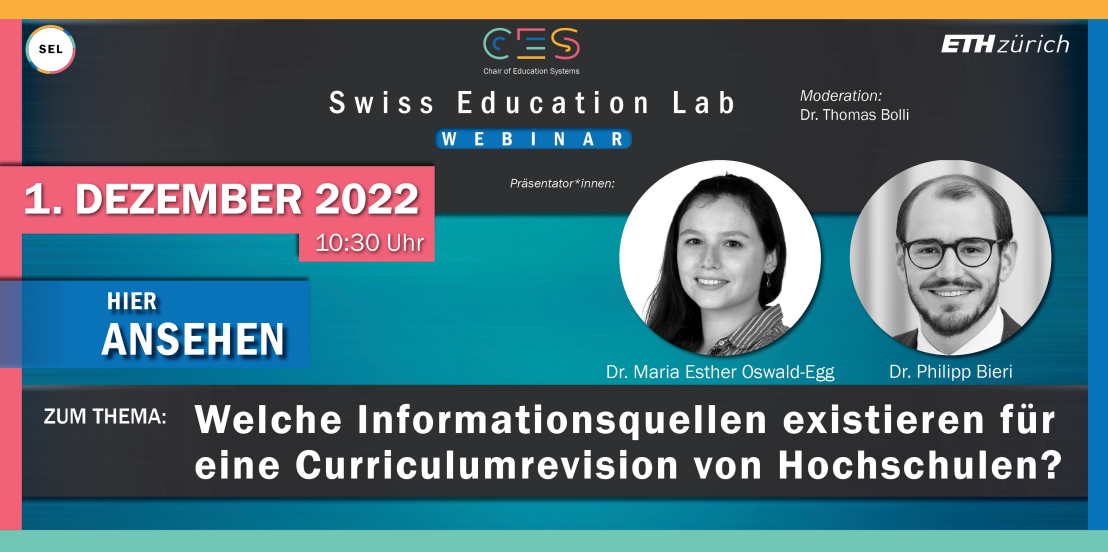
Maria Esther Oswald-Egg of ETH Zurich has statistically analyzed the changes in young people's interests during Corona. Stefanie Näf mirrored these changes from the perspective of the apprenticeship platform Yousty AG.
In the subsequent discussion, the breadth of young people's career choices, the gamification of career choices and the role of trial apprenticeships in the search for an apprenticeship were among the topics discussed.
This project, funded by the Hirschmann Foundation, examines the social status of VET from the perspective of companies and young people in Switzerland. It examines the social status of VET, i.e. its social value relative to other educational programmes. This is done on the one hand using PISA data on the competences of ninth graders in Switzerland and on the other hand using recruitment surveys of companies which are carried out in cooperation with Yousty AG.
Rageth, L. & Sritharan, A. (2022)
Decision-Making under Information Asymmetry: How do Misinformation and Uncertainty Affect Tertiary Education Choices?
CES Working Papers, 12
Bolli, T., & Rageth, L. (2022)
external pageDoes Time Since Arrival have an Effect on Immigrants’ Preferences for Vocational Education and Training Programs in Switzerland?call_made
International Migration Review
Rageth, L. & Sritharan, A. (2022).
Does Familiarity with Vocational and Professional Education Shape Employers' Educational Preferences in Hiring Processes?
CES Working Paper Series, 10.
Bolli, T., Rageth, L., & Renold, U. (2019).
The Social Status of Vocational Education and Training in Switzerland. KOF Working Papers, 451.
Bolli, T., L. Rageth and U. Renold (2018): Le statut social de la formation professionnelle en Suisse n'a pas baissé, L'industrie du bois IDB, Le Mont-sur-Lausanne, Switzerland.
Bolli, T., L. Rageth and U. Renold (2018):
Le statut social de la formation professionnelle en Suisse n'a pas baissé, L'industrie du bois IDB, Le Mont-sur-Lausanne, Switzerland.
Bolli, T., L. Rageth and U. Renold (2018):
The social status of VET in Switzerland, KOF Analyses, 3.
Bolli, T., L. Rageth and U.Renold (2018):
external pageThe social status of VET in Switzerland has remained constancall_madet, SGAB Newsletter, 2.
Bolli, T., Rageth, L., & Renold, U. (2018).
The social status of vocational education and training in Switzerland: Information brochure for professionals in vocational education and training (No. 110). KOF Studies.
Bolli, T., & Rageth, L. (2016).
Measuring the Social Status of Education Programmes: Applying a New Measurement to Dual Vocational Education and Training in Switzerland.
This project uses various indicators to examine how the labour market situation and the competences of graduates after a university degree in food science have developed over time. This analysis differentiates between the various types of higher education institutions, i.e. university and university of applied sciences. For this purpose, the survey of university graduates conducted by the Federal Statistical Office (FSO) is analysed, which surveys graduates one and five years after completing their education.
Bieri, P. (2021)
Analysis of the Degree Programmes in the Field of Food Science and Technology Offered by Swiss Universities and Universities of Applied Sciences. CES Studies, 24.
Oswald-Egg, M. E. & Pusterla, F. (2021).
Studying Food Science in the Swiss Higher Education Institutions: Study Program Satisfaction, Job Profile, and Labor Market Outcomes. CES Studies, 22.
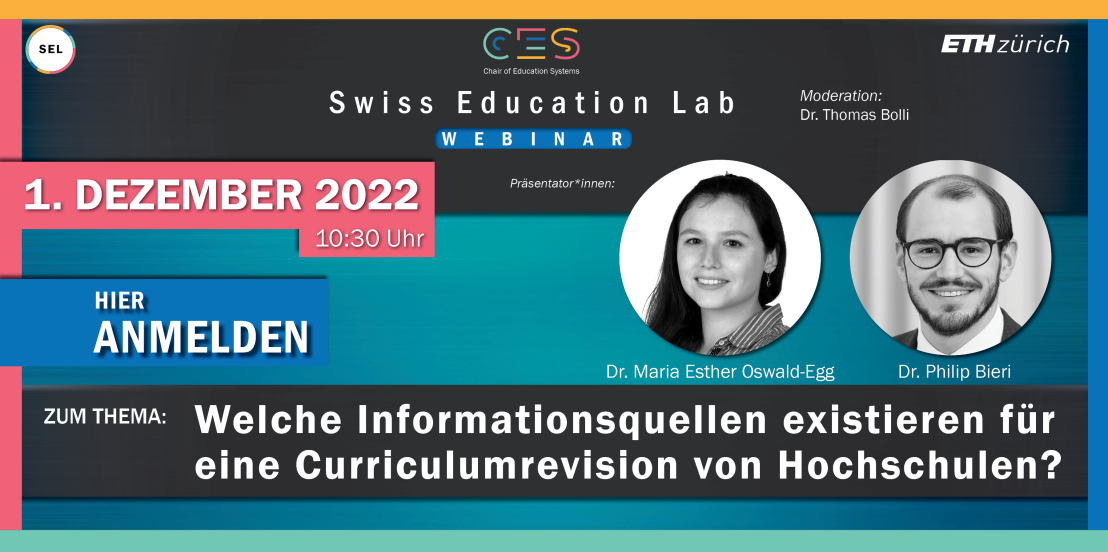
The fourth SEL webinar is about structured data that can be used in a revision of a university curriculum.
Maria Esther Oswald-Egg from the ETH Zurich shows the possibilities of the SFSO's graduate survey. Philipp Bieri from ETH Zurich will present a method for benchmarking the content of different training courses.
This project was commissioned by the sponsors of the Framework Curriculum for Colleges of Higher Education in Business and Economics (RLP HFW) to investigate how the topicality of the RLP HFW is developing and, at the same time, to provide an evidence-based foundation for a possible revision. Such a basis not only helps in deciding when to revise the RLP HFW, but also optimizes the revision process using an evidence-based, detailed basis for discussion. To this end, structured surveys of HFW students, employers, and alumni were conducted, as well as semi-structured interviews with employers. For example, the results show that HFW students, employers, and alumni find that soft skills are better acquired in the workplace than in the classroom.
Bolli, T., Maldonado Mariscal, M. K., Rageth, L., Renold, U., & Sritharan, A. (2020).
Sechster Bericht zur Evaluation des Rahmenlehrplans für den Bildungsgang «dipl. Betriebswirtschafter/in HF»: Validierung der Revision des RLP HFW 2008. CES Studien, 6.
Renold, U., Bolli, T., Maldonado-Mariscal, K., Rageth, L., & Sritharan, A. (2019).
Bedeutung der Digitalisierung in der höheren Berufsbildung. KOF Analysen, 2019(2), 38-47.
Renold, U. and T. Bolli (2019).
Ist die duale Berufsbildung für die Digitalisierung gewappnet?, in Aufwachsen im digitalen Zeitalter: Bericht der Eidgenössischen Kommission für Kinder- und Jugendfragen, 24-29.
Renold, U., Maldonado-Mariscal, K., Rageth, L., & Sritharan, A. (2019).
Bericht zu den Interviews mit Arbeitgebern/innen zur Evaluation des Rahmenlehrplans für den Bildungsgang" dipl. Betriebswirtschafter/in HF" (No. 131). KOF Studien.
Renold, U., Bolli, T., Maldonado-Mariscal, K., Rageth, L., & Sritharan, A. (2019).
Fünfter Bericht zur Evaluation des Rahmenlehrplans für den Bildungsgang" dipl. Betriebswirtschafter/in HF": Befragung von Ehemaligen und vertiefte Betrachtung der Digitalisierung (No. 130). KOF Studien.
Renold, U., Bolli, T., & Rageth, L. (2018).
Vierter Bericht zur Evaluation des Rahmenlehrplans für den Bildungsgang "dipl. Betriebswirtschafter/in HF": Ist der RLP HFW für alle Firmen aktuell? (No. 112). KOF Studien.
Bolli, T., Rageth, L., & Renold, U. (2018).
The social status of vocational education and training in Switzerland: Information brochure for professionals in vocational education and training (No. 110). KOF Studien.
Bolli, T. and U. Renold (2017).
external pageComparative Advantages of School and Workplace Environment in Skill Acquisition: Empirical Evidence from a Survey among Professional Tertiary Education and Training Students in Switzerland, Evidence-Based HRM: a Global Forum for Empirical Scholarshicall_madep, 5(1), 6-29.
Renold, U., Bolli, T., & Rageth, L. (2017).
Dritter Bericht zur Evaluation des Rahmenlehrplans für den Bildungsgang "dipl. Betriebswirtschafter/in HF": Aktualität des Rahmenlehrplans und Wirksamkeit pädagogischer Instrumente (No. 91). KOF Studien.
Renold, U., Bolli, T., & Rageth, L. (2015).
Evaluation des Rahmenlehrplans für den Bildungsgang «dipl. Betriebswirtschafter/in HF», Bericht zur ersten Befragungswelle 2014: Erfüllt der Rahmenlehrplan HFW seine Ziele?: Bericht zur ersten Befragungswelle 2014. KOF Studies, 62.
Bolli, T., L. Rageth and U. Renold (2015):
Welche Kompetenzen sind am wichtigsten und wo können sie am besten erworben werden? Eine empirische Untersuchung für die höheren Fachschulen für Wirtschaft, KOF Analysen, 4.
In cooperation with Yousty AG, this research project investigated the training behavior of young adults who have obtained a Federal Certificate of Proficiency (EFZ) or a Federal Vocational Certificate (EBA). Data on the decision-making process and the level of information on further education were collected using a structured survey. The results show, for example, that there is still potential for providing information and raising awareness among young adults with regard to the diverse and complex possibilities of further education.
Bolli, T., Rageth, L., Renold, U., & Sritharan, A. (2020).
Informationsstand und Entscheidungsprozess zu weiterführenden Ausbildungen: Bericht zur Bildungssituation von jungen Erwachsenen nach der Berufslehre. CES Studien, 5.
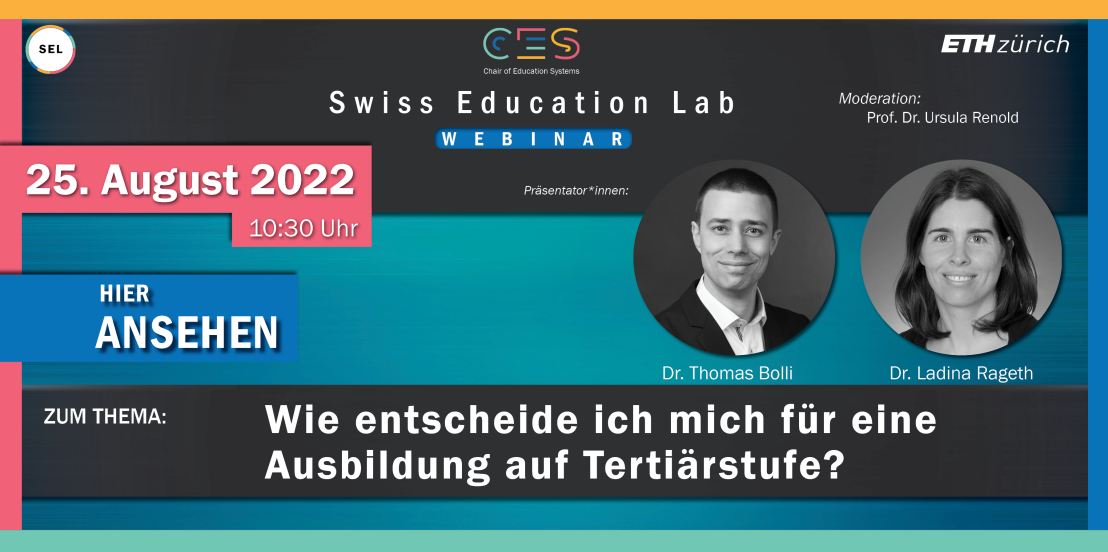
The second SEL webinar is about decisions regarding tertiary education. Thomas Bolli of ETH Zurich has analyzed the decision-making process and the level of information of young adults after a basic vocational education.
Ladina Rageth of ETH Zurich discusses how valuable different tertiary degrees and non-formal degrees are perceived on the labor market.
This project was commissioned by the State Secretariat for Education, Research and Innovation (SERI) to examine the effectiveness of the collaborative bodies in VET/PET. The project analyzed how well the governance within the Swiss VET/PET system and the system interfaces work. To this end, a structured survey of VET/PET stakeholders at national, cantonal and local level was conducted in collaboration with Yousty AG. Finally, recommendations for action on governance within the Swiss VET/PET system were derived. Overall, the results show that the governance of the Swiss VET/PET system is judged to be relatively good.
Caves, K., & Oswald-Egg, M. E. (2021)
The Networked Role of Intermediaries in Education Governance and Public-Private Partnership. CES Working Papers, 7.
Renold, U., Caves, K., & Oswald-Egg, M. E. (2019).
Governance im Berufsbildungssystem Schweiz: Systemische Steuerung des schweizerischen Berufsbildungssystems (No. 127). KOF Studien.
This research project investigated the influence of work experience, acquired either in an apprenticeship or in an internship, on the labor market situation of university graduates in Switzerland. For this purpose, data from the Graduate Studies Universities (EHA) of the Swiss Federal Statistical Office were analyzed. Overall, the results show that work experience improves the labor market situation of university graduates.
Oswald-Egg, M. E., & Renold, U. (2021).
No experience, no employment: The effect of vocational education and training work experience on labour market outcomes after higher education. Economics of Education Review, 80, 102065.
Bolli, T., Caves, K., & Oswald-Egg, M. E. (2019).
Valuable experience: How internships affect university graduates' income (No. 459). KOF Working Papers.
This project, commissioned by libs Industrielle Berufslehren Schweiz, investigated the development of the regulation of mechanical, electrical and metalworking (MEM) occupations in the context of educational reforms and changes in the world of work between 1930 and 2017 in Switzerland. The outlook also highlighted which trends and institutional aspects of the Swiss education system are important for the future development of the occupational field. This outlook shows, for example, that vocational apprenticeships as well as tertiary degrees in higher vocational education need to be properly positioned for better recognition in the international context.
Oswald-Egg, M. E., & Renold, U. (2015).
Entwicklung der Reglementierung von 10 MEM-Berufen im Kontext von Bildungsreformen und dem Wandel in der Arbeitswelt: Eine Kurzstudie im Auftrag von LIBS: Eine Kurzstudie im Auftrag von LIBS Industrielle Berufslehren Schweiz, Baden. KOF Studies, 63.
This project, funded by the State Secretariat for Education, Research and Innovation (SERI), shed light on the importance of vocational education and training for the innovative capacity of the economy. Data from the KOF Innovation Survey was used to examine the extent to which employees with different educational qualifications show complementarity with digitalization, work organization and capital. The results show, for example, that people with a higher vocational education benefit particularly from information technologies, while communication technologies show the highest complementarity with people with a university education.
Bolli, T., & Pusterla, F. (2021).
Is technological change really skills-biased? Firm-level evidence of the complementarities between ICT and workers' education. Economics of Innovation and New Technology, 1-23.
Pusterla, F., & Renold, U. (2020).
Does ICT Affect the Demand for Vocationally Educated Workers in Switzerland? CES Working Papers Series, 2020(1).
Pusterla, F. (2020).
The Complementary Effect of Organizational Practices and Workers’ Level of Education. KOF Working Papers, 478, 1-24.
Bolli, T., Renold, U., & Wörter, M. (2018).
Vertical educational diversity and innovation performance. Economics of Innovation and New Technology, 27(2), 107-131.
Bolli, T., & Pusterla, F. (2018).
Complementarities among types of education in affecting firms' productivity (No. 449). KOF Working Papers.
